NCERT Solutions for Class 10 English Chapter 1 - A Letter to God
| Table of contents |

|
| Oral Comprehension - Page 5 |

|
| Oral Comprehension - Page 6 |

|
| Oral Comprehension - Page 7 |

|
| Thinking about the Text |

|
| Thinking about the Language |

|
Oral Comprehension - Page 5
Q1. What did Lencho hope for?
Ans: Lencho wasa farmer. He hoped for rain as the only thing that his field of ripe corn needed was a shower. Without rain, the crops would die, and he would suffer a big loss.
Q2. Why did Lencho say the raindrops were like ‘new coins’?
Ans: Lencho compared the raindrops to ‘new coins’ because he believed they would help his crops grow, leading to a better harvest. This would bring him more prosperity. He imagined:
- Big drops as ten cent pieces
- Smaller drops as five cent pieces
This comparison reflected his hope for a fruitful yield and his optimism about the rain's impact on his livelihood.
Q3. How did the rain change? What happened to Lencho’s fields?
Ans: The rain initially poured down heavily. However, a strong wind soon picked up, bringing with it very large hailstones that fell alongside the rain. This hailstorm lasted for an hour, causing significant damage to Lencho's fields:
- The hailstones destroyed Lencho's corn fields.
- All the flowers were washed away from the plants.
- The fields appeared white, resembling a layer of salt.
- Not a single leaf remained on the trees.
Lencho felt deep sadness as he realised that this year, there would be no corn.
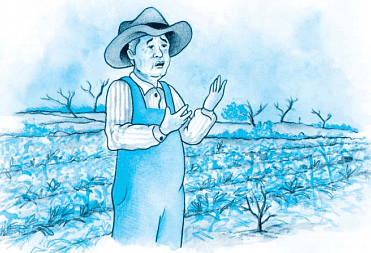 Lencho After Rain
Lencho After Rain
Q4. What were Lencho’s feelings when the hail stopped?
Ans: After the hailstorm, Lencho felt a deep sense of sadness. He realised that the storm had completely ruined his harvest. His thoughts were filled with:
- A bleak future for himself and his family.
- Worries about not having enough food for the coming year.
- A feeling of despair, as he saw no hope left.
He stood in the middle of the field, reflecting on the devastation, and expressed to his sons, “A plague of locusts would have left more than this. The hail has left nothing. This year we will have no corn.”
That night was filled with sorrow, as Lencho lamented, “All our work, for nothing. There’s no one who can help us. We’ll all go hungry this year.”
Oral Comprehension - Page 6
Q1. Who or what did Lencho have faith in? What did he do?
Ans: Lencho had strong faith in God. He believed that God could see everything, including what was in his heart. After a hailstorm destroyed his crops, he wrote a letter to God asking for one hundred pesos to replant his field.
When the postmaster read Lencho's letter, he felt compelled to help. He:
- Gathered money from his employees and contributed part of his own salary.
- Managed to collect just over half of the requested amount.
- Sent the money to Lencho in an envelope, signing it simply as "God".
Lencho later expressed disappointment when he received only seventy pesos and accused the post office employees of stealing the rest.
Q2. Who read the letter?
Ans: The Postmaster read the letter because the address on the letter was too absurd.
Q3. What did the postmaster do then?
Ans:
Upon seeing the address, the postmaster initially laughed at what he thought was a foolish request. However, he soon realised it might be serious and read the letter with curiosity. Moved by the writer's emotions, he decided to help.
- He contributed part of his salary.
- He collected money from friends, acquaintances, and relatives.
- Ultimately, he sent the money to the letter's writer.
Oral Comprehension - Page 7
Q1. Was Lencho surprised to find a letter for him with money in it?
Ans: No, Lencho was not at all surprised to see the letter from God with money inside it. His confidence and faith in God were such that he had expected that reply from God.
Q2. What made him angry?
Ans:
Lencho became angry after counting the money he received. He had requested one hundred pesos, but only seventy pesos arrived. Lencho was certain that God would not make a mistake or deny him what he asked for. This led him to believe that the post office employees must have taken the missing thirty pesos.
In response to his frustration, Lencho wrote a letter to God, expressing his disappointment:
- He stated that he only received seventy pesos.
- He requested the remaining amount, as he needed it urgently.
- He accused the post office employees of being crooks.
Thinking about the Text
Q1. Who does Lencho have complete faith in? Which sentences in the story tell you this?
Ans: Lencho had complete faith in God. The sentences in the story that show this are as follows:
(a) But in the hearts of all who lived in that solitary (single) house in the middle of the valley, there was a single hope: help from God.
(b) All through the night, Lencho thought only of his one hope: the help of God, whose eyes, as he had been instructed, see everything, even what is deep in one’s conscience (Inner sense of right or wrong).
(c) “God,” he wrote, “if you don’t help me, my family and I will go hungry this year.”
(d) He wrote ‘To God’ on the envelope, put the letter inside and, still troubled, went to town.
(e) God could not have made a mistake, nor could he have denied Lencho what he had requested.
(f) It said: “God: of the money that I asked for, only seventy pesos reached me. Send me the rest, since I need it very much.”
Q2. Why does the postmaster send money to Lencho? Why does he sign the letter ‘God’?
Ans: The Postmaster was deeply touched by Lencho's unwavering faith in God. He decided to send money to Lencho for the following reasons:
- He wanted to support Lencho's strong belief.
- He aimed to preserve Lencho's faith in God.
- He signed the letter as 'God' to create the impression that it was a divine response.
This act was a thoughtful way to reinforce Lencho's faith while helping him in his time of need.
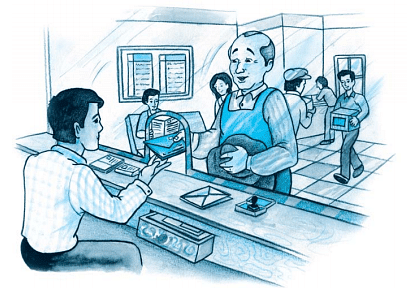
Q3. Did Lencho try to find out who had sent the money to him? Why/Why not?
Ans: No, Lencho did not try to find out who had sent the money to him. This is because he had great confidence in God and never suspected that it could be someone else other than God who would send him the money. His faith in God was so strong that he believed that God had sent him the money.
Q4. Who does Lencho think has taken the rest of the money? What is the irony in the situation? [Remember that the irony of a situation is an unexpected aspect of it. An ironic situation is strange or amusing because it is the opposite of what is expected.]
Ans: Lencho believes that the post office employees have taken the rest of the money he requested. Ironically, it is these very employees who actually sent him the money.
The situation is ironic because:
- Lencho suspects those who helped him during his crisis.
- He does this to maintain his faith in God, despite receiving assistance.
- His mistrust of the post office employees contradicts the help they provided.
 Ans: I don't think there can be any such people in the real world. Lencho was literate and yet he didn’t know how his letter would reach God without any address. He was a naive and stupid farmer with blind faith in God and his powers.
Ans: I don't think there can be any such people in the real world. Lencho was literate and yet he didn’t know how his letter would reach God without any address. He was a naive and stupid farmer with blind faith in God and his powers.Q6. There are two kinds of conflict in the story: between humans and nature, and between humans themselves. How are these conflicts illustrated?
Ans:
- The conflict between humans and nature is shown by the destruction of Lencho’s crops by the hailstorm (thunderstorm that produces hail). As the crops failed because of hail, Lencho started feeling sad and gloomy after the storm appropriately projected (predicted) the conflict (clash) between nature and man.
- The story also shows another conflict among humans. The postmaster, along with the help of the other post office employees, sent Lencho the money that they could manage to collect. They were not related to Lencho in any manner. It was an act of kindness and selflessness on their part.
- Although they did a good deed, Lencho blamed them for taking some of the money. This shows that man does not have faith in his fellow humans, thereby giving rise to this conflict.
Thinking about the Language
Q1. There are different names in different parts of the world for storms, depending on their nature. Can you match the names in the box with their descriptions below, and fill in the blanks? You may use a dictionary to help you.

(a) A violent tropical storm in which strong winds move in a circle: ____ c _____
(b) An extremely strong wind: _____ a _____
(c) A violent tropical storm with very strong winds: _____ p _____
(d) A violent storm whose centre is a cloud in the shape of a funnel: _____ n _____
(e) A violent storm with very strong winds, especially in the western Atlantic ocean: _____ r _____
(f) A very strong wind that moves very fast in a spinning movement and causes a lot of damage: _____ l _____
Ans:
(a) Cyclone
(b) Gale
(c) Typhoon
(d) Tornado
(e) Hurricane
(f) Whirlwind
Q2. Match the sentences in Column A with the meanings of ‘hope’ in Column B.
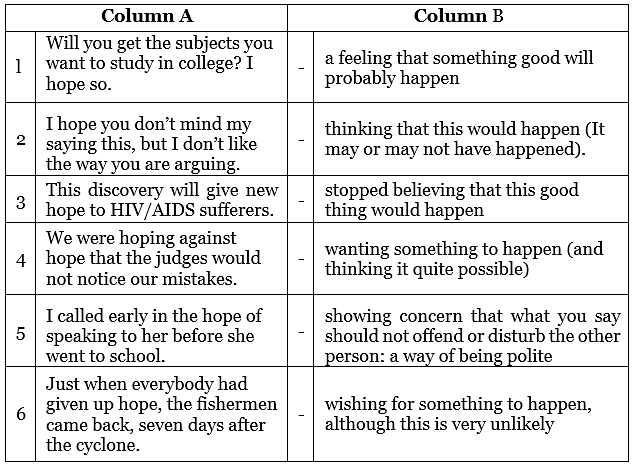 Ans:
Ans:
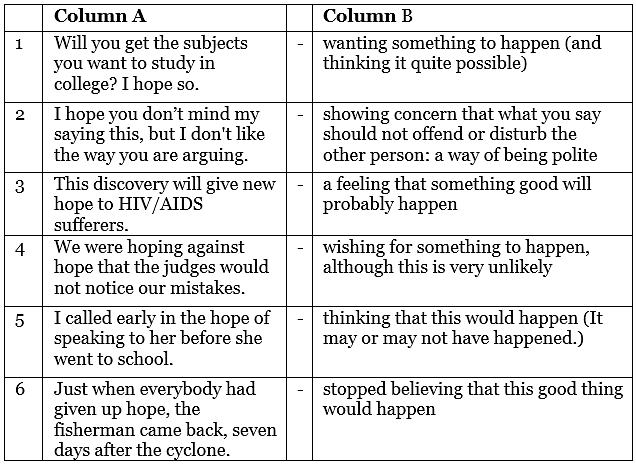
Q3. Join the sentences given below using who, whom, whose, which as suggested.
(a) I often go to Mumbai. Mumbai is the commercial capital of India. (which)
(b) My mother is going to host a TV show on cooking. She cooks very well. (who)
(c) These sportspersons are going to meet the President. Their performance has been excellent. (whose)
(d) Lencho prayed to God. His eyes see into our minds. (whose)
(e) This man cheated me. I trusted him. (whom)
Ans:
(a) I often go to Mumbai, which is the commercial capital of India.
(b) My mother, who cooks very well, is going to host a TV show on cooking.
(c) These sportspersons, whose performance has been excellent, are going to meet the President.
(d) Lencho prayed to God, whose eyes see into our minds.
(e) This man, whom I trusted, cheated me.
Q4. Find sentences in the story with negative words, which express the following ideas emphatically.
(a) The trees lost all their leaves.
_________________________________________
(b) The letter was addressed to God himself.
_________________________________________
(c) The postman saw this address for the first time in his career.
_________________________________________
Ans:
(a) The trees lost all their leaves.
Not a leaf remained on the trees.
(b) The letter was addressed to God himself.
It was nothing less than a letter to God.
(c) The postman saw this address for the first time in his career.
Never in his career as a postman had he seen that address.
Q5. In pairs, find metaphors from the story to complete the table below. Try to say what qualities are being compared. One has been done for you. 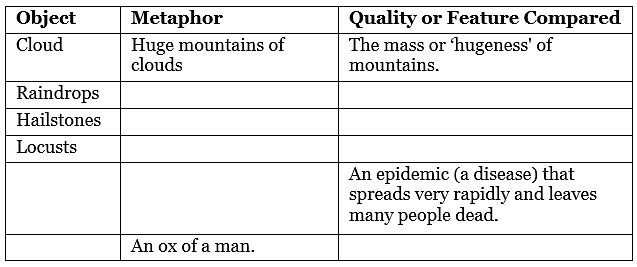
Ans:
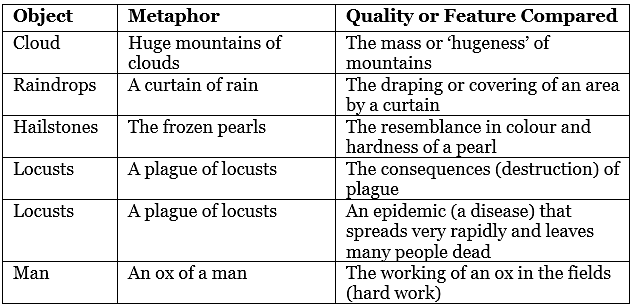
Although they did a good deed, Lencho blamed them for taking some of the money.
|
30 videos|419 docs|58 tests
|
FAQs on NCERT Solutions for Class 10 English Chapter 1 - A Letter to God
| 1. What is the central theme of the story "A Letter to God"? |  |
| 2. How does Lencho express his faith in God after the hailstorm? |  |
| 3. What is the significance of the ending of "A Letter to God"? |  |
| 4. How do the post office employees react to Lencho's letter? |  |
| 5. What does Lencho's character reveal about rural life and values? |  |

|
Explore Courses for Class 10 exam
|

|


















